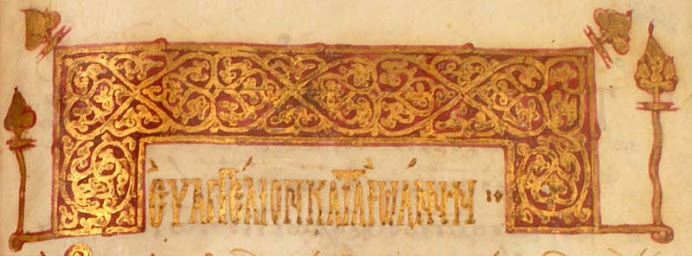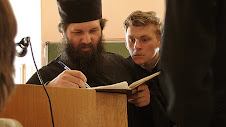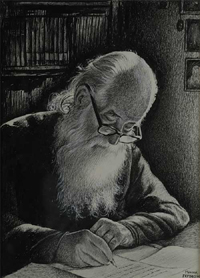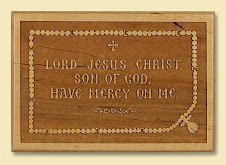 Abba Dorotheus of Gaza, the sixth-century Desert Father whose works remain the constant companion of monastics, left us a valuable little treatise entitled "On the Holy Lenten Fast," from which I will offer a few excerpts. We tend to think of fasting as keeping to a set of dietary rules. Abba Dorothus explains that there is much more to fasting than simply reading the ingredients on a package of Oreos:
Abba Dorotheus of Gaza, the sixth-century Desert Father whose works remain the constant companion of monastics, left us a valuable little treatise entitled "On the Holy Lenten Fast," from which I will offer a few excerpts. We tend to think of fasting as keeping to a set of dietary rules. Abba Dorothus explains that there is much more to fasting than simply reading the ingredients on a package of Oreos:There are two kinds of gluttony. There is the kind which concerns taste: a man does not want to eat a lot but he wants it to be appetizing. It follows that such a person eats the food that pleases him and is defeated by the pleasure of it. He keeps the food in his mouth, rolling it around and round, and has not the heart to swallow it because he enjoys the taste. This is called fastidiousness [Gk: laimargia]. Another man is concerned with satisfying himself. He doesn't ask for fancy food nor does he case especially about whether the taste is nice or not, he only wants to eat and fill his stomach. This is gluttony [gastromargia]. I will tell you how it gets this name: margainein means to rage furiously, to be mad; according to the profane, margos is the name given to the man who rages furiously or is mad. When this disease or mania for packing his belly full of food comes upon a man, therefore, it is called gastromargia, the madness of the stomach, whereas lairmargia is the madness of the palate. These must be guarded against and abandoned seriously by the man who desires to be cleansed of his sins. They accord not with the needs of the body, but with its vicious inclinations, and if they are tolerated, they lead a man into sin.It's quite possible, we see, to keep the fast technically, even reducing our food intake, and still miss the mark by being picky about what we eat. Keeping the rules of fasting has never been easier than today: we forget just how extraordinary it is, for instance, to have fresh fruits and vegetables available year-round. Gone are the days of forty days of potatoes and pickled cabbage. And then there is the whole question of the advent of the Soy Age, with its reign of phony baloney. (It is possible, theoretically, to please both palate and belly with tofu, although I don't count myself among the number able to do so.) All of this gives us a chance to be perfectly fastidiousness while keeping to the letter of the law.
The saint goes on to remind us that fasting involves all our actions, not just the foods we do (or don't) eat:
We must not only keep a sharp watch over our diet, but keep away from all other kinds of sin so that as our stomach keeps fast, so also may our tongue as we abstain from calumny, from deceit, from idle talk, from railing and anger and all other vices which arise from the tongue.He concludes with a marvelous allegorical reading of Christ's entry into Jerusalem, reminding us what the Great Fast is all about:
So also let our eyes keep fast. No looking for trivialities, no letting the eyes wanter freely, no impudent lying in wait for people to talk to. The same with the hands and feet, to prevent them from doing anything evil. Fasting in this way, as St Basil says, is an acceptable fast and, leaving behind all the evil to which our senses are inclined, we may come to the holy day of the Resurrection, renewed and clean and worthy to share in the holy mysteries, as we have already said.
First we go out to meet Our Lord and receive Him with palms and olive branches and we seat Him on the colt and come with Him into the Holy City. What does this mean: sitting on a colt? He is seated on a colt that he may convert the soul (which, as the prophet says, has become irrational and is compared to senseless beasts) into an image of God, and subject it to His own divinity. What does it mean: going to meet him with palms and olive branches? When someone marches out to war against an adversary and returns victorious, all his own people go before him with palm branches to mark his victory. The palm-branch is the symbol of victory. Again, when one man is injured by another, he desires to approach an authority who can vidicate him. He carries an olive branch and calls out, asking to be heard and helped. The olive branch is the symbol of mercy [pity]. Therefore, we go out to meet our Master Christ, with palms because He is victorious – for He conquered our enemy – and with olive branches – for we are asking His mercy. May we, by asking, conquer through Him and be found carrying the emblems of His victory, not only the victory by which He won for us, but also the victory which we also won through Him by the prayers of all the saints. Amen.Translation taken from this edition.
Photo: You either recognize this one, or you don't.









2 comments:
"Just one wafer-thin mint of sin more, then I'll start the Fast!" says flesh to soul every year!
And just one more drink, and then I'll go back on the wagon.
Post a Comment